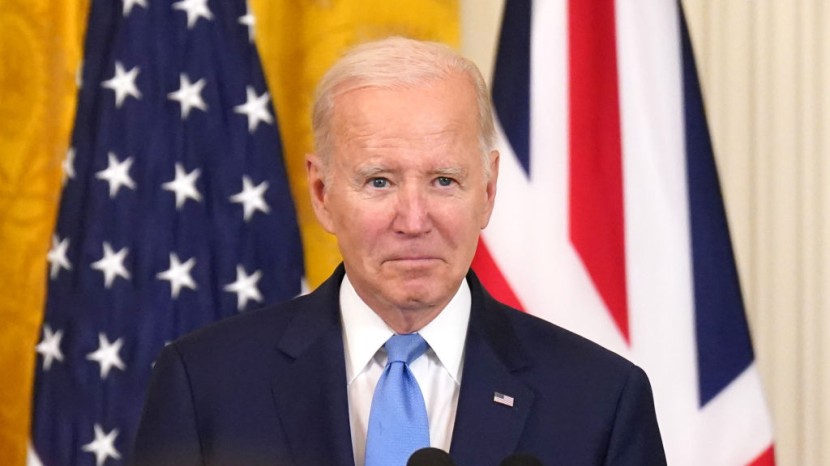
President Joe Biden defended his decision to provide Ukraine with cluster munitions, which are prohibited by many of the United States's closest allies, on Friday, stating that it was a difficult choice, but "the Ukrainians are running out of ammunition" in their fight against Russian forces.
Biden struggled for months with the decision to provide the munitions, which disperse small, lethal bomblets across the battlefield.
US to Send More Weapons to Ukraine
Per NY Times, they have been known to cause severe injuries months or years after a conflict has ended, frequently among children who gather up bomblets that did not detonate when dropped.
The president ultimately determined that depriving Ukraine of the armaments would leave it defenseless against Russia. He stated that it was a provisional measure until conventional artillery ammunition could be produced in more significant quantities.
The decision represented a departure from several of America's closest allies and prompted criticism from Democrats, who expressed concern that the weapons endangered America's moral standing. The measure could also complicate Biden's efforts to demonstrate unity during next week's NATO summit in Lithuania.
NATO Secretary General Jens Stoltenberg evaded whether he believed it prudent for the United States to provide the weaponry to Ukraine. US officials have noted that Russia has employed cluster munitions in Ukraine for most of the conflict.
President Volodymyr Zelensky has been pressuring Biden to provide him with more to flush out the Russians entrenched in trenches and prevent the Ukrainian counteroffensive.
Several weeks ago, Jake Sullivan, the president's national security adviser, told reporters at the White House that Ukraine had made a direct request for the munitions. Sullivan stated that the Ukrainians had pledged to use the munitions to avoid civilian casualties but that there were no guarantees.
Biden characterized the transfer as a limited endeavor during a "transition period" instead of a fundamental shift in US policy. He had to circumvent his administration's condemnation of Russia's bombing of civilian areas during its barbaric invasion of Ukraine, as per Daily Mail.
He made a similar remark after his address on health care on Friday in response to why the United States was now providing them. Cluster munitions disperse "bomblets" over a large area, allowing them to target enemy forces effectively.
Although the US is not a signatory to a pact, he acknowledged the international effort to ban the munitions, supported by more than 100 nations. Neither are Ukraine and Russia.
He also discussed the obstacles the Ukrainians face in their renewed offensive now that Russian forces have entrenched their positions and the Ukrainians are attempting to reclaim territory.
The Ukrainian military has been steadily recuperating territory and liberating some villages from Russian control, but at a slower rate than some offensives from the previous year.
However, the conflict has reduced stockpiles. The Biden administration has made a complete about-face on cluster munitions, going from labeling their use in the Russia-Ukraine conflict a "war crime" last year to insisting that they are essential to Ukraine's defenses this year.
Meanwhile, Zelensky reiterated his request for long-range armaments to conduct offensive and defensive operations against the invading Russian forces. Zelensky stated on Friday during a visit to the Czech Republic that Ukraine was discussing long-range weapon systems with some allies, including the United States.
Read Also: Yellen Criticizes China's Treatment of US Companies, Urges Beijing To Adopt Market Reforms
EU to Spend $545 Million for Ukraine
According to VOA News, the visit to Prague is part of Zelensky's foreign tour preceding next week's NATO summit, where he is anticipated to advocate for Ukraine's membership.
The European Union announced on Friday that its member states have agreed to spend $545 million to increase munitions production in Ukraine and replenish the munitions inventories of EU members.
The Act in Support of Ammunition Production, or ASAP, will concentrate primarily on manufacturing artillery projectiles and missiles.
Ukrainian forces have advanced more than a kilometer against Russian troops near the eastern city of Bakhmut, a military spokesman told Ukrainian television on Friday. Serhiy Cherevatyi was quoted as saying.
The controversial weapons are launched from a canon and disperse dozens of "bomblets" over a large area. They can continue to inflict damage long after the war has ended. 123 nations have prohibited cluster munitions due to their risk to civilians, but the United States, Ukraine, and Russia have not.
Cluster munitions are anticipated to be included in a new U.S. aid package for Ukraine that will be announced on Friday. The provision of cluster munitions to Ukraine is being considered, Pentagon spokesperson Brigadier General Patrick Ryder said on Thursday.
On the battlefield, Ukraine and Russia employ their own cluster munitions. However, Ukraine has requested that the United States deliver cluster munitions because its forces are running low on ammunition. Due to the civilian risk, the United States has resisted providing cluster munitions thus far.
Related Article : Zaporizhzhia Attack: UN Scrambles To Order Inspection of Nuclear Power Plant Following Catastrophic Plot Claims
© 2026 HNGN, All rights reserved. Do not reproduce without permission.








